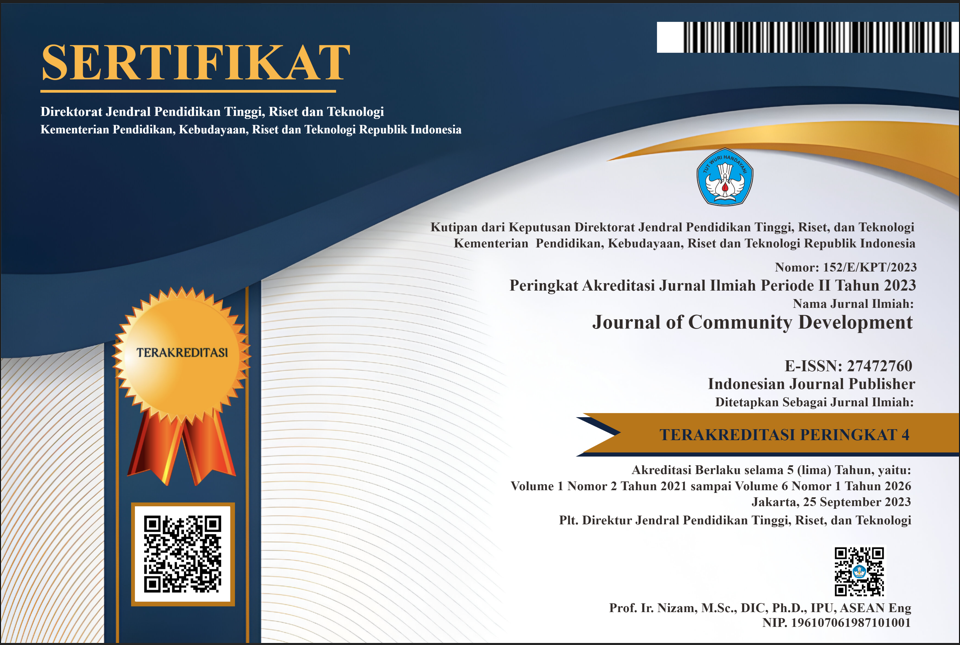Optimalisasi Kelas Ibu Hamil Dalam Upaya Pencegahan Stunting di Kelurahan Sungai Andai Banjarmasin
DOI:
https://doi.org/10.47134/comdev.v4i3.244Keywords:
Cadres, stunting, Pregnant Women ClassAbstract
Written in English with a distance between sentences of 1 space and the number of words between 150-250. The abstract should contain introductions, methods, results and discussions and conclusions (without citation). Avoid using citations in t The problem of stunting is one part of double burden malnutrition (DBM) which has a very detrimental impact both in terms of health and in terms of economic productivity, both in the short and long term for Indonesia. Data from the Sungai Andai Health Center in 2022 as many as 29 pregnant women or 14.5% of pregnant women experienced CED and as many as 31 people or 15.5% of pregnant women experienced Anemia. The implementation of classes for pregnant women is only carried out once every three to four months and the implementation of classes for pregnant women is only in the form of health education without nutritional management for pregnant women, this shows that maximum efforts are still needed to prevent stunting where CED and anemia in pregnant women are one of the risk factors causing the occurrence of stunting in children. PKM is carried out by providing materials and processing healthy food as well as training on screening nutritional problems for pregnant women to cadres in the Sungai Andai. In evaluating the pretest results, the lowest average score was 65 and in the posttest results the average score was 93. There was an increase in the previous score. and after delivering the training, the average score increased by 28. The increase in knowledge was demonstrated by the cadres' ability to explain healthy food menus to pregnant women in the Pregnant Women's Class Activities and data collection carried out by cadres in screening pregnant women with nutritional problems.
Downloads
References
BKKBN (2021) Panduan Pelaksanaan Pendampingan Keluarga dalam Upaya Percepatan Penurunan Stunting di Tingkat Desa Kelurahan. Jakarta. Available at: https://kampungkb.bkkbn.go.id/kampung/23364/intervensi/786066/pendampingan-ibu-hamil-oleh-tpk.
Kementerian Kesehatan RI (2021) Buku Saku Hasil Studi Status Gizi Indonesia (SSGI) Tahun 2021 - Badan Kebijakan Pembangunan Kesehatan | BKPK Kemenkes, Buku Saku Hasil Studi Status Gizi Indonesia (SSGI) Tingkat Nasional, Provinsi, Kabupaten/Kota Tahun 2021. Kementerian Kesehatan RI, Jakarta. Available at: https://repository.badankebijakan.kemkes.go.id/id/eprint/4899/1/Hasil%20SSGI%20Tahun%202021%20Tingkat%20Kabupaten_Kota.pdf.
Kementrian Kesehatan RI, K.R. (2022) Kehamilan ‘1000-hari-pertama-kehidupan’, Artikel: Ayosehat Kemenkes : 1000-hari-pertama-kehidupan. Available at: https://ayosehat.kemkes.go.id/1000-hari-pertama-kehidupan/home.
Mumpuni, R.A. and Rohmawati, W. (2018) ‘Hubungan Peranserta Kader dengan Keikutsertaan Ibu Hamil Trimester III dalam Kelas Ibu Hamil di wilayah Puskesmas Delanggu Klaten’, Jurnal Riset Kebidanan Indonesia, 1(1), pp. 15–20. Available at: https://doi.org/10.32536/jrki.v1i1.3.
Puskesmas Sunagi Andai (2022) Profil Puskesmas Sungai Andai. Banjarmasin.
Simbolon, D. and Batubual, B. (2019) Pencegahan stunting periode 1000 hari pertama kehidupan melalui intervensi gizi spesifik pada ibu hamil kurang energi kronis. Sleman: Deepublish.
Yuliastuti, E. (2014) ‘Faktor-Faktor Yang Berhubungan Dengan Kekurangan Energi Kronis Pada Ibu Hamil Di Wilayah Kerja Puskesmas Sungai Bilu Banjarmasin’, An Nadaa, 1(2). Available at: https://ojs.uniska-bjm.ac.id/index.php/ANN/article/view/220.
Downloads
Published
How to Cite
Issue
Section
License
Copyright (c) 2024 Susanti Suhartati, Eirene Eunike M.G, Novita Dewi Iswandari

This work is licensed under a Creative Commons Attribution 4.0 International License.







